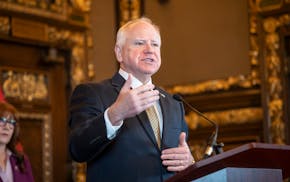Younger and newer investors who have relied more on automated investment systems — so-called robo-advisers — fared better during the COVID-19 financial market crash than those relying on their own human intuition.
A University of Minnesota professor found the use of robo-advisers, which use algorithms to create portfolios based on a user's investment goals and risk tolerance, has expanded in recent years with advances in machine learning and artificial intelligence. Overall, investors who used robo-advisers to manage their portfolios experienced significantly smaller losses than human investors during the downturn, according to Mochen Yang, an associate professor at the U's Carlson School of Management.
Younger and less experienced investors gained a further edge because they delegated a larger proportion of their assets to robo-advisers to manage, Yang and two co-authors reported in the study, published in October, that analyzed investors' daily portfolio and transaction information on a leading online investment platform in Taiwan during the four weeks before and after the beginning of the pandemic market crash. Younger people enjoyed that added benefit because they are more likely to rely on algorithms, according to other research cited in the study.
The findings were "really reassuring and encouraging in terms of the value of algorithms," Yang said. "If you were an investor that actively used robo-advisers to manage a part of your portfolio, you would be able to mitigate the portfolio losses to a substantial degree compared to investors that did not use robo-advisers."
Both groups of investors — those using robo-advisers and humans — suffered losses in the four weeks after Feb. 24, 2020, which the study defined as the beginning of what became the fastest market crash in history. But during that time, robo-adviser investors had a daily performance advantage of nearly 13% on human investors. The study said that was "both statistically significant and economically meaningful." An investor who had an average portfolio value of $43,208 and was using a robo-adviser would have lost $1,599 less than a human investor.
"Everybody was losing money, and there was pretty much no way around it," Yang said. "But had you used a robo-adviser, you would have lost significantly less money."
The study also examined why robo-advisers outperformed human investors. The prevailing theory was that algorithm-based systems simply were faster than humans and could trade more frequently to seize market opportunities that people couldn't. But the study found the difference wasn't speed: Robo-advisers and humans traded at similar frequencies. Instead, it was the way robo-advisers acted.
Compared to humans, the automated systems traded more adaptively and with greater discipline to mitigate losses.
"The investors who actively used robo-advisers were able to de-risk their portfolios much more effectively during the financial market crisis," Yang said. "People who trusted their own expertise and didn't use robo-advisers, they traded frequently, but they did not reduce the risk of their portfolios. They still tried to maintain the same level of risk and that ended up being very costly. They lost money because of that."
A robo-adviser, Yang said, can serve as a "tool for amateur investors who are likely to panic when the market is going downhill, and they want to prevent themselves from doing the wrong thing."
For them, "delegating this decision to an algorithm is going to be a good choice because the algorithm knows more about investment than sort of amateur investors, in that sense," Yang said.
While robo-adviser investors endured smaller losses during the downturn, they also maintained their performance advantage in the subsequent market upturn that began in late March 2020 when the Federal Reserve announced it would support the flow of credit to large corporations. The robo-advisers' superior performance, however, was not a continuation of their results in a normal market, when its returns were similar to those of human investors, Yang said. The benefits of its risk-reduction strategy only appeared during the financial crisis.
Using a robo-adviser in a normal market might not be the best strategy when taking more risk might earn better returns, Yang said.
Banks and financial services firms increasingly offer robo-advisers through their online platforms. Assets under management in the robo-adviser market are projected to reach nearly $1.5 billion this year with an average of close to $71,000 in assets per user, according to Statista.
Robo-advisers are typically not that expensive, with banks offering free access or charging minimal management fees, Yang said. Working with human financial advisers is also an option, Yang said, but they are comparatively more expensive and might not be as accessible.
However, "if you have access to that kind of service, we still believe that you could very well do better than with a robo-adviser and better than using robo-advising tools," Yang said. "Because there's still meaningful expertise possessed by financial advisers, and they may have other sort of information about what the market is going to do that may not necessarily be available to robo-advisers."
Todd Nelson is a freelance writer in Lake Elmo. His e-mail is todd_nelson@mac.com.

Delta hiked fares for solo travelers, until Twin Cities travel experts caught the change

In first speech back, UnitedHealth's new CEO pledges to review hot-button issues

A child had measles at Mall of America, concerning state health officials who don't know source

Ramstad: Gov. Walz, things are not getting done in Minnesota

